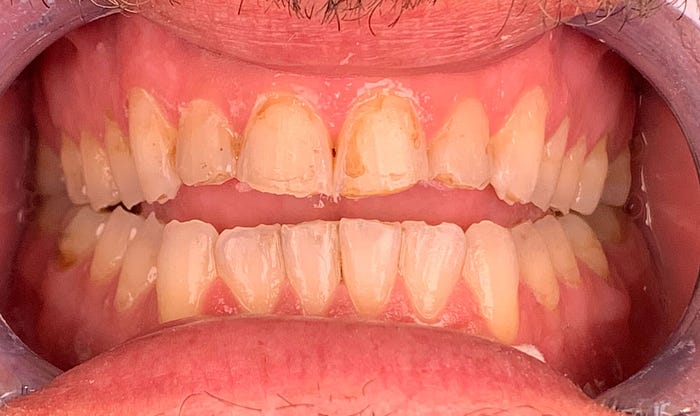More from Dental Implants Dentures
More in Politics
Related Blogs
Archives
Social Share
The Importance of Bone Density for Dental Implants & What Happens During the Dental Implant Procedure With Bone Grafting
Body
As dental professionals at URBN Dental, we understand the significance of bone density in the success of dental implant procedures. Dental implants have revolutionized the field of dentistry, offering a permanent solution for replacing missing teeth. However, the success of these implants relies heavily on the quality and quantity of the jawbone. In cases where bone density is inadequate, bone grafting becomes essential to ensure the long-term stability and functionality of dental implants.
Before delving into the importance of bone density and the role of bone grafting, let’s first understand what dental implants are. Dental implants are artificial tooth roots made of biocompatible materials such as titanium. These implants are surgically placed into the jawbone to support replacement teeth or dental prostheses, such as crowns, bridges, or dentures.
The Importance of Bone Density for Dental Implants
Bone density refers to the amount of bone tissue present in a specific area of the jawbone. Adequate bone density is crucial for dental implants because it provides the necessary support and stability for the implant to integrate successfully with the surrounding bone. Without sufficient bone density, dental implants may fail to osseointegrate, leading to complications such as implant loosening, instability, or even implant failure.

Insufficient bone density can compromise the stability, longevity, and overall effectiveness of dental implants. Let’s delve into why sufficient jawbone density is crucial:
- Stability of Dental Implants: Dental implants rely on the surrounding jawbone for stability and support. Optimal bone density ensures proper integration of the implant with the surrounding bone, preventing implant loosening or failure.
- Long-Term Durability: Adequate jawbone density is essential for the long-term durability of dental implants. A strong foundation provided by healthy bone density promotes the longevity of the implants, reducing the risk of complications and the need for future revisions.
- Functional Bite and Chewing Ability: Healthy jawbone density enables patients to enjoy restored bite functionality and chewing ability with dental implants. Stable implants anchored in dense bone provide a reliable platform for chewing forces, mimicking the strength and function of natural teeth.
- Preservation of Facial Structure: Sufficient jawbone density helps maintain the natural contours and integrity of the facial structure. Inadequate bone density can lead to bone resorption or atrophy, resulting in changes to facial appearance, such as sunken cheeks or a collapsed jawline.
- Success of Cosmetic Results: Optimal jawbone density contributes to the success of cosmetic outcomes with dental implants. Dense bone provides a stable foundation for the attachment of aesthetic dental prostheses, ensuring natural-looking and aesthetically pleasing results that enhance the patient’s smile and overall facial aesthetics.
Bone Grafting: A Solution for Poor Bone Quality
In cases where patients have poor bone quality or insufficient bone volume, bone grafting becomes necessary to augment the jawbone and create a suitable environment for dental implant placement. Bone grafting involves the transplantation or placement of bone graft material into the deficient area of the jawbone. This graft material can be sourced from various sources, including the patient’s own bone (autograft), donor bone (allograft), or synthetic materials (alloplastic grafts).
The Dental Implant Procedure With Bone Grafting
- Initial Consultation: The dental implant procedure begins with a comprehensive evaluation and consultation at one of URBN Dental’s convenient locations across Houston, including Uptown Houston, Midtown Houston, Montrose, City Center, Katy, East River, and Houston Heights. During this consultation, our experienced dentists will assess your oral health, review your medical history, and determine your suitability for Dental implants cost Houston.
- Diagnostic Imaging: To assess bone density and identify areas of bone deficiency, diagnostic imaging such as X-rays, CT scans, or cone beam computed tomography (CBCT) may be performed. These imaging techniques provide detailed three-dimensional images of the jawbone, allowing our dentists to plan the implant placement and bone grafting procedure with precision.
- Bone Grafting Procedure: If bone grafting is deemed necessary to augment the jawbone, the procedure will be scheduled prior to the dental implant placement. During the bone grafting surgery, our skilled oral surgeons will carefully access the deficient area of the jawbone and place the bone graft material. This graft material serves as a scaffold for new bone formation, promoting the regeneration and growth of natural bone over time.
- Healing and Integration: After the bone grafting procedure, a period of healing is required to allow the bone graft to integrate with the surrounding bone tissue. This process, known as osseointegration, is essential for creating a stable foundation for the dental implants. Depending on the extent of bone grafting performed, this healing period typically ranges from several months to a year.
- Implant Placement: Once the jawbone has healed and the bone graft has integrated successfully, the dental implant placement procedure can proceed. During this surgical procedure, titanium implant posts are precisely positioned into the jawbone at predetermined locations. In cases where bone density is compromised, additional techniques such as guided bone regeneration or sinus lift may be employed to optimize implant placement.
- Final Restoration: After the dental implants have been placed, a healing period is allowed for osseointegration to occur. Once the implants have fully integrated with the jawbone, custom-made dental prostheses such as crowns, bridges, or dentures are securely attached to the implants, providing patients with functional and aesthetically pleasing replacement teeth.
Dental Implants FAQs
What are dental implants?
Dental implants are artificial tooth roots made of titanium that are surgically placed into the jawbone to support replacement teeth or dental prostheses, such as crowns, bridges, or dentures.
How do dental implants differ from traditional implants?
Dental implants offer a permanent solution for replacing missing teeth, while traditional implants may require additional support structures. Dental implants also provide superior stability and functionality compared to traditional implants.
Can dental implants replace multiple missing teeth?
Yes, dental implants can be used to replace a single missing tooth, multiple missing teeth, or even a full arch of teeth. With advancements in implant dentistry, only four implants may be sufficient to support a full set of replacement teeth.
Are dental implants suitable for patients with poor bone quality?
Patients with poor bone quality may still be candidates for dental implants with the use of bone grafting techniques to augment the jawbone. Additionally, longer implants or alternative implant placement strategies, such as posterior implants, can help address bone deficiencies.
How long does it take to recover from dental implant surgery?
The healing and recovery time following dental implant surgery can vary depending on individual factors such as overall health, bone quality, and the extent of the procedure. While some patients may experience minimal discomfort and resume normal activities shortly after surgery, others may require a longer healing period.
Can dental implants improve oral health?
Yes, dental implants can improve oral health by restoring proper bite functionality and preventing further bone loss associated with missing teeth. Dental implants also help maintain the alignment of adjacent natural teeth and reduce the risk of gum disease and decay.
Is a soft diet necessary after dental implant surgery?
While some patients may choose to follow a soft diet during the initial healing period to minimize discomfort and promote healing, it is not always necessary. Your dentist will provide specific post-operative instructions tailored to your individual needs to ensure a smooth recovery.
How long do dental implants last?
With proper care and maintenance, dental implants have the potential to last a lifetime. Routine dental check-ups, proper oral hygiene practices, and avoiding habits such as smoking can help maximize the longevity of dental implants and ensure their continued success.
Can dental implants be placed in a single day?
In some cases, dental implants can be placed and restored with temporary prostheses in a single day, commonly referred to as same-day implants. However, the suitability of this approach depends on various factors, including the patient’s oral health, bone quality, and treatment plan.
Do dental implants provide fixed teeth similar to natural teeth?
Yes, dental implants provide a stable and secure foundation for replacement teeth, resulting in fixed teeth that closely resemble natural teeth in appearance, function, and feel. Patients can enjoy the confidence of a new smile with dental implants.
Visit URBN Dental for Dental Implants
Bone density plays a crucial role in the success and longevity of dental implants. For patients with poor bone quality or insufficient bone volume, bone grafting serves as a viable solution to augment the jawbone and create a suitable environment for dental implant placement. At URBN Dental, our team of experienced dentists and oral surgeons is dedicated to providing comprehensive dental implant services, including bone grafting, to ensure optimal outcomes for our patients. If you’re considering dental implants or have concerns about bone density, we encourage you to schedule a consultation at one of our convenient locations in Houston.












Comments